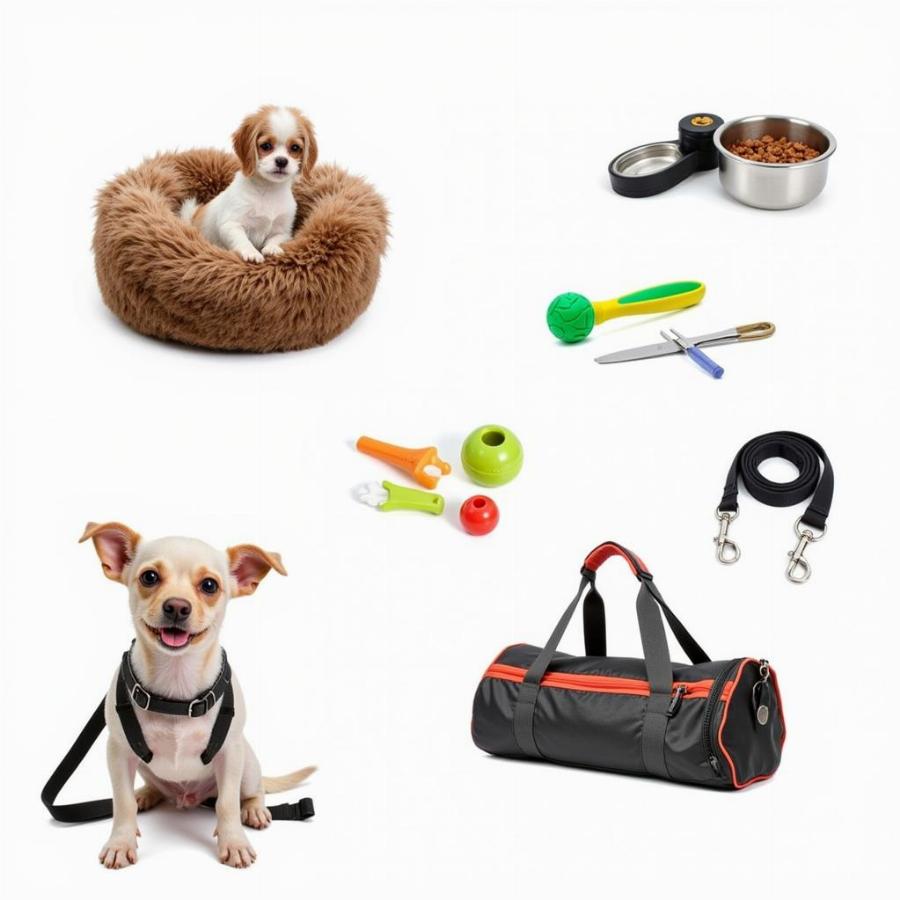Solving the New York Times crossword puzzle and stumped by the clue “variety of tiny dog”? You’ve come to the right place! While the crossword clue itself doesn’t specify a particular breed, it hints at the wonderful world of small dog breeds. Let’s delve into the possibilities and explore the charming characteristics of some popular tiny dog breeds that might just be the answer you’re looking for. We’ll also discuss the joys and responsibilities of owning a small dog, covering everything from choosing the right breed to providing proper care.
Decoding the “Variety of Tiny Dog” Clue
This crossword clue could refer to a number of small dog breeds. Some common possibilities include Chihuahua, Pomeranian, Maltese, Yorkshire Terrier, or Papillon. The best way to confidently fill in the answer is to consider the number of letters required and cross-reference with other clues in the puzzle. However, understanding the characteristics of these breeds can be helpful even beyond the crossword!
Popular Tiny Dog Breeds and Their Unique Traits
Each tiny dog breed boasts unique personality traits and care requirements. Choosing the right one depends on your lifestyle and preferences.
Chihuahua
Known for their big personalities in small packages, Chihuahuas are fiercely loyal and protective of their owners. They require minimal grooming but benefit from regular socialization.
Pomeranian
These fluffy companions are intelligent, playful, and surprisingly bold. Their thick double coat requires regular brushing to prevent matting.
Maltese
Elegant and gentle, Maltese dogs are affectionate and thrive on human companionship. Their long, white fur requires daily brushing.
Yorkshire Terrier
Yorkies are known for their spunky attitude and silky coat. They are relatively low-shedding but need regular grooming.
Papillon
With their butterfly-like ears, Papillons are intelligent, playful, and easily trainable. Their long fur requires regular brushing, particularly around the ears and tail.
What to Consider When Choosing a Tiny Dog
Bringing any dog into your life is a significant decision. With tiny dogs, there are specific factors to consider.
Lifestyle Compatibility
Do you live in a small apartment or a large house? Are you an active person or do you prefer a more relaxed lifestyle? Choosing a breed whose energy level matches yours is crucial for a harmonious relationship.
Grooming Needs
Long-haired breeds like the Maltese and Yorkshire Terrier require daily brushing, while short-haired breeds like the Chihuahua need less grooming. Consider the time and effort you’re willing to dedicate to grooming.
Training and Socialization
Early training and socialization are vital for all dogs, especially tiny breeds. This helps them develop good manners and prevents behavioral issues.
Health Considerations
Small dog breeds can be prone to certain health issues, such as dental problems and tracheal collapse. Research breed-specific health concerns and choose a reputable breeder to minimize risks.
Caring for Your Tiny Companion
Proper care ensures your tiny dog lives a long, healthy, and happy life.
Nutrition
Feed your tiny dog a high-quality diet formulated for small breeds. Their smaller stomachs require more frequent, smaller meals.
Exercise
Even tiny dogs need regular exercise to stay physically and mentally stimulated. Daily walks and playtime are essential.
Veterinary Care
Regular checkups and preventative care are crucial for maintaining your tiny dog’s health.
 Essential Care Items for Tiny Dogs
Essential Care Items for Tiny Dogs
Frequently Asked Questions (FAQ)
-
Are tiny dogs good for apartment living? Yes, many tiny dog breeds thrive in apartment settings due to their smaller size and lower exercise needs.
-
Are tiny dogs more difficult to train? Not necessarily. While some tiny breeds can be stubborn, consistency and positive reinforcement are key to successful training.
-
Do tiny dogs require special food? Yes, it’s best to feed tiny dogs food specifically formulated for their size and nutritional needs.
-
Are tiny dogs good with children? It depends on the individual dog’s temperament and the children’s age and maturity level. Supervise interactions between children and dogs, especially tiny breeds.
-
How long do tiny dogs typically live? Small dog breeds generally have longer lifespans than larger breeds, often living for 12-16 years or even longer.
Further Exploration
- Small Dog Breeds for First-Time Owners
- Understanding Your Tiny Dog’s Body Language
- Choosing the Right Toys for Your Small Dog
Conclusion
Finding the right “variety of tiny dog” for your NYT crossword clue involves understanding the characteristics of different small breeds. Beyond the puzzle, owning a tiny dog is a rewarding experience, provided you choose a breed that suits your lifestyle and provide the proper care. From Chihuahuas to Pomeranians, each tiny breed offers a unique blend of personality and charm. By researching and understanding their specific needs, you can ensure your tiny companion thrives and brings years of joy to your life.
Beaut Dogs: Your Guide to the Wonderful World of Canine Companions
Beaut Dogs is your one-stop resource for everything related to dog care, offering expert advice on breed selection, nutrition, training, and more. We are dedicated to providing valuable and trustworthy information to help you navigate the joys and responsibilities of dog ownership. When you need assistance, don’t hesitate to contact us at [email protected] for detailed and accurate answers. Beaut Dogs is passionate about helping you provide the best possible care for your furry friend. Visit https://beautdogs.com today!